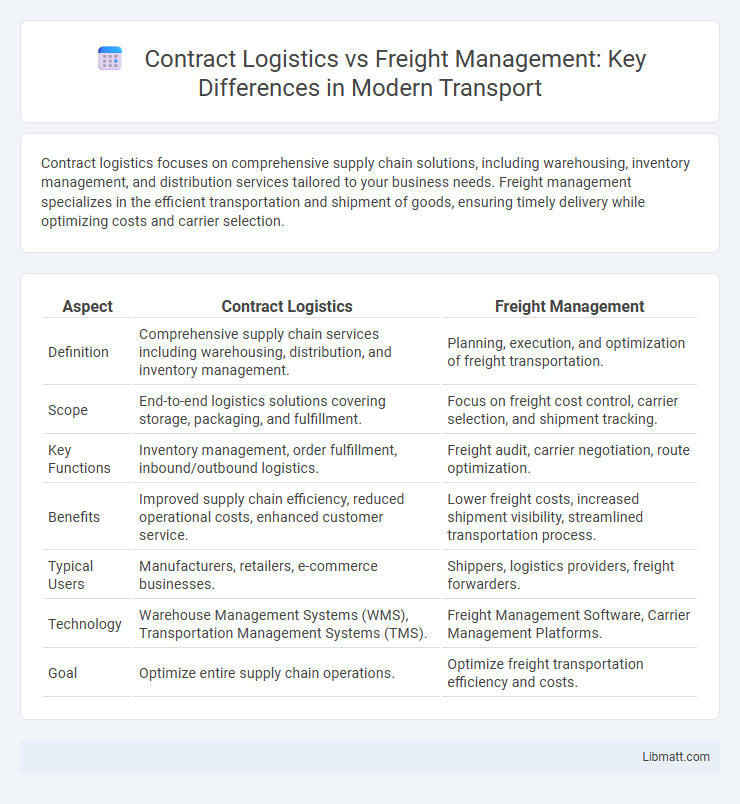Contract logistics focuses on comprehensive supply chain solutions, including warehousing, inventory management, and distribution services tailored to your business needs. Freight management specializes in the efficient transportation and shipment of goods, ensuring timely delivery while optimizing costs and carrier selection.
Table of Comparison
| Aspect | Contract Logistics | Freight Management |
|---|---|---|
| Definition | Comprehensive supply chain services including warehousing, distribution, and inventory management. | Planning, execution, and optimization of freight transportation. |
| Scope | End-to-end logistics solutions covering storage, packaging, and fulfillment. | Focus on freight cost control, carrier selection, and shipment tracking. |
| Key Functions | Inventory management, order fulfillment, inbound/outbound logistics. | Freight audit, carrier negotiation, route optimization. |
| Benefits | Improved supply chain efficiency, reduced operational costs, enhanced customer service. | Lower freight costs, increased shipment visibility, streamlined transportation process. |
| Typical Users | Manufacturers, retailers, e-commerce businesses. | Shippers, logistics providers, freight forwarders. |
| Technology | Warehouse Management Systems (WMS), Transportation Management Systems (TMS). | Freight Management Software, Carrier Management Platforms. |
| Goal | Optimize entire supply chain operations. | Optimize freight transportation efficiency and costs. |
Introduction to Contract Logistics and Freight Management
Contract logistics involves outsourcing comprehensive supply chain functions such as warehousing, inventory management, and order fulfillment to specialized third-party providers. Freight management concentrates on the planning, execution, and optimization of transportation processes to ensure efficient movement of goods. Both services play crucial roles in enhancing operational efficiency and reducing costs within the supply chain.
Defining Contract Logistics
Contract logistics involves outsourcing comprehensive supply chain functions such as warehousing, transportation, and inventory management to a third-party provider, often resulting in customized solutions that enhance operational efficiency. This approach contrasts with freight management, which primarily concentrates on the planning and execution of shipping goods from one location to another. Companies leverage contract logistics to streamline processes, reduce costs, and improve service levels by integrating multiple logistics activities under a single contractual agreement.
Understanding Freight Management
Freight management involves coordinating the efficient transportation of goods, including carrier selection, route optimization, and shipment tracking to reduce costs and improve delivery times. It emphasizes managing the entire freight process from origin to destination, ensuring compliance with regulations and maintaining clear communication across supply chain partners. Understanding freight management is essential for businesses aiming to streamline operations and enhance customer satisfaction through timely and cost-effective delivery solutions.
Key Differences Between Contract Logistics and Freight Management
Contract logistics involves comprehensive supply chain solutions, including warehousing, inventory management, and order fulfillment, while freight management primarily focuses on the transportation and shipment of goods. Contract logistics providers offer end-to-end services that optimize your entire supply chain, whereas freight management centers on coordinating the movement of cargo via various modes like trucking, air, or sea. Understanding these key differences helps you select the right strategy for efficient and cost-effective supply chain operations.
Core Services Offered in Contract Logistics
Contract logistics provides comprehensive supply chain solutions including warehousing, inventory management, order fulfillment, and distribution services tailored to optimize your operations. Core services often extend to value-added activities like packaging, reverse logistics, and real-time tracking, enabling efficient end-to-end management. Unlike freight management, which primarily focuses on transportation and shipment coordination, contract logistics integrates multiple functions to streamline your entire supply network.
Core Functions of Freight Management
Freight management primarily involves the planning, execution, and optimization of the transportation of goods, including carrier selection, route planning, and shipment tracking. Core functions also encompass freight auditing, cost control, and compliance with regulatory requirements to ensure efficient and cost-effective delivery. Your logistics strategy benefits from streamlined freight management by reducing transit times and minimizing shipping expenses.
Benefits of Contract Logistics for Businesses
Contract logistics offers businesses enhanced supply chain efficiency by integrating warehousing, transportation, and inventory management into a single, streamlined solution. This approach reduces operational costs through economies of scale and leverages advanced technology for real-time visibility and improved order accuracy. Companies benefit from greater flexibility and scalability, allowing them to adapt quickly to market demands and focus on core competencies.
Advantages of Freight Management Solutions
Freight management solutions offer enhanced visibility and control over the entire shipping process, enabling cost reduction through optimized routing and load consolidation. These solutions improve delivery accuracy and timeliness, reducing delays and increasing customer satisfaction. Your business can benefit from real-time tracking and advanced analytics, which streamline operations and support strategic decision-making.
Choosing Between Contract Logistics and Freight Management
Choosing between contract logistics and freight management depends on the complexity and scale of Your supply chain needs. Contract logistics offers comprehensive solutions including warehousing, inventory management, and end-to-end transportation, ideal for businesses seeking integrated services. Freight management focuses primarily on the transportation of goods, optimizing shipping routes and carrier selection to reduce costs and improve freight efficiency.
Future Trends in Logistics and Freight Management
Future trends in logistics and freight management emphasize automation, AI-driven analytics, and sustainable practices to optimize supply chain efficiency. Contract logistics providers increasingly integrate IoT technology and real-time data tracking to enhance inventory management and reduce operational costs. Your business can benefit from predictive logistics solutions that improve decision-making and adapt to evolving market demands.
contract logistics vs freight management Infographic

 libmatt.com
libmatt.com